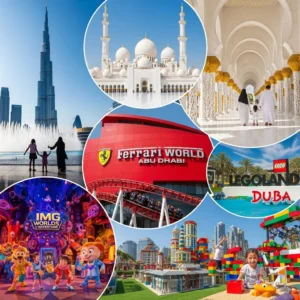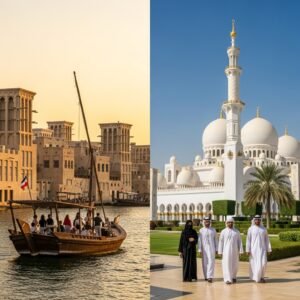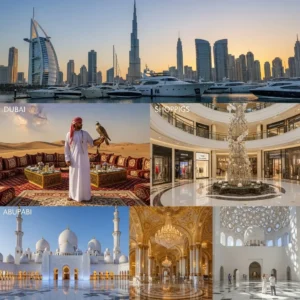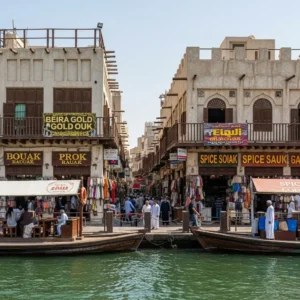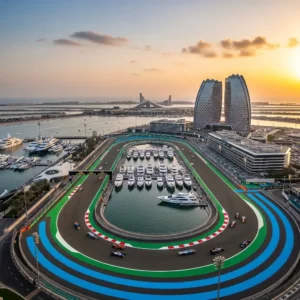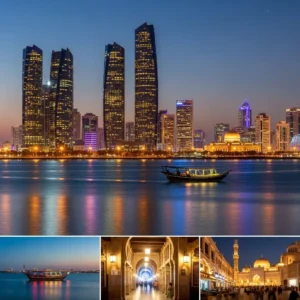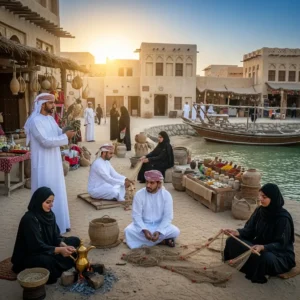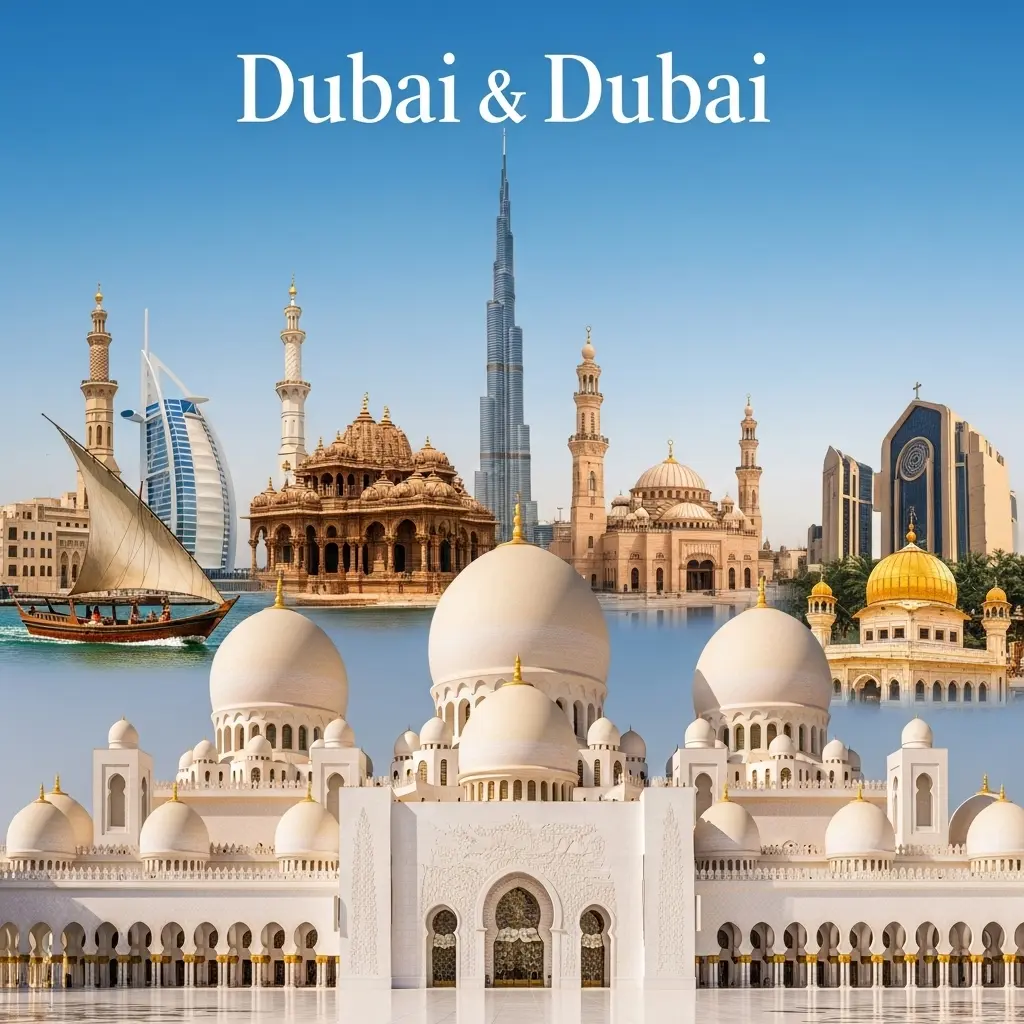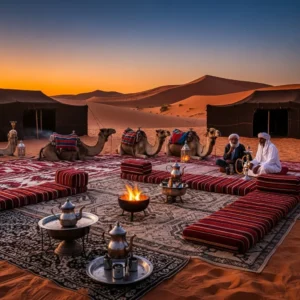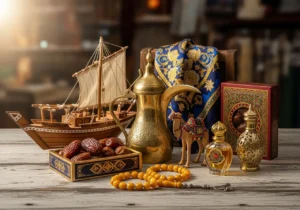7 Sacred Sanctuaries: An Enlightening Journey to Spiritual Attractions in the UAE
Beyond the shimmering skyscrapers and opulent malls, the United Arab Emirates holds a profound and serene soul. This is a land where ancient traditions of faith are not only preserved but are celebrated with architectural grandeur and a spirit of remarkable tolerance. Exploring the spiritual attractions UAE offers is to embark on a journey that transcends typical tourism, offering moments of peace, reflection, and a deeper understanding of the cultural fabric that binds this nation.
From the breathtaking domes of Abu Dhabi’s grand mosques to the vibrant community hubs of Dubai’s temples and gurudwaras, these sacred spaces are more than just landmarks; they are beacons of harmony. They tell a story of a nation that looks boldly to the future while holding its spiritual heritage in the highest regard. This guide will take you through the most significant religious and spiritual sites across Dubai and Abu Dhabi, inviting you to experience the tranquil heart of the Emirates.
The Spirit of Tolerance in the Emirates spiritual attractions UAE
The UAE has made interfaith harmony a cornerstone of its national identity. This commitment is not just a policy but a visible reality, evident in the diverse places of worship that flourish side-by-side. For visitors, this creates a unique opportunity to witness a living model of peaceful coexistence. A tour of the spiritual attractions UAE showcases is a powerful lesson in mutual respect and cultural openness, making for a truly enriching travel experience.
This journey is not about adhering to one faith but about appreciating the universal human quest for meaning and connection. The architectural beauty, the palpable sense of peace, and the welcoming atmosphere of these sites are open to people of all backgrounds, making them essential stops for any thoughtful traveler.
Abu Dhabi: A Capital of Cultural and Spiritual Grandeur spiritual attractions UAE
Abu Dhabi, the nation’s capital, is home to some of the most significant and visually stunning spiritual landmarks in the world. A visit here is essential for anyone seeking to understand the UAE’s commitment to faith, art, and culture. The spiritual attractions UAE is most famous for are often found within this serene emirate.
1. Sheikh Zayed Grand Mosque: A Masterpiece of Islamic Art spiritual attractions UAE
The Sheikh Zayed Grand Mosque is, without exaggeration, one of the most beautiful buildings ever created. It is a true architectural marvel and a profound symbol of the nation’s spiritual heart. Conceived by the late Sheikh Zayed bin Sultan Al Nahyan, the founding father of the UAE, the mosque was designed to be a sanctuary of peace and a welcoming place for people of all faiths to learn about Islam.
The moment you first lay eyes on its 82 pristine white marble domes and four towering minarets against the clear blue sky, you feel a sense of awe. The sheer scale and symmetry are breathtaking. The exterior is adorned with intricate floral designs, using semi-precious stones like lapis lazuli, amethyst, and mother-of-pearl, which shimmer in the sunlight. A walk through its vast courtyard, featuring the world’s largest marble mosaic, is a serene experience in itself.
Inside, the wonders continue. The main prayer hall is home to the world’s largest hand-knotted carpet, a masterpiece that took over 1,200 artisans two years to create. Above, seven of the world’s most magnificent chandeliers, crafted with millions of Swarovski crystals and 24-karat gold, cast a warm and ethereal glow. The quiet reverence within the hall, combined with the exquisite artistry surrounding you, creates an atmosphere of deep tranquility. This is the crown jewel of all spiritual attractions UAE offers.
Guided tours are highly recommended as they provide invaluable insights into the architectural details, Islamic art, and cultural significance of the mosque. These tours are offered free of charge and are a fantastic way to deepen your appreciation for this incredible place.
2. Abrahamic Family House: A Beacon of Interfaith Harmony
Located on Saadiyat Island, the cultural heart of Abu Dhabi, the Abrahamic Family House is one of the world’s most significant spiritual attractions UAE has recently unveiled. This unique project features a mosque, a church, and a synagogue, all built in the same vicinity, representing a powerful statement of interfaith unity and tolerance.
The vision for the Abrahamic Family House is to foster understanding and dialogue among the three Abrahamic faiths: Islam, Christianity, and Judaism. The architectural design is profoundly symbolic. While each house of worship has its own unique identity, they are unified by a stunning contemporary design and share a central forum where visitors can gather and learn.
The Eminence Ahmed El-Tayeb Mosque is oriented towards the Kaaba in Mecca, the St. Francis Church faces the rising sun in the east, and the Moses Ben Maimon Synagogue points towards Jerusalem. The use of geometric patterns, natural light, and clean lines creates a sense of harmony and shared heritage.
Visiting this site is a deeply moving experience. It is a living embodiment of the UAE’s commitment to building bridges between different cultures and faiths. It serves as a global landmark for peace and a place for learning, dialogue, and reflection for generations to come.
Dubai: A Metropolis of Diverse Faiths
While known for its futuristic vision, Dubai also boasts a rich tapestry of cultures and religions. The city’s spiritual attractions UAE showcases are a testament to its large expatriate population and its ethos of welcoming people from all over the world. A spiritual tour here reveals a different side of the city, one rooted in community and faith.
3. Jumeirah Mosque: An Icon of Islamic Architecture
The Jumeirah Mosque is one of Dubai’s most beloved landmarks and a beautiful example of traditional Fatimid architecture. Its intricate white stone façade and elegant twin minarets make it one of the most photographed mosques in the city, especially when illuminated at night.
What makes Jumeirah Mosque particularly special is its “Open Doors, Open Minds” policy. It is one of the few mosques in Dubai that welcomes non-Muslim visitors for guided tours six days a week. These tours, run by the Sheikh Mohammed Centre for Cultural Understanding, are designed to demystify Islam and provide insights into Emirati culture and traditions in a friendly, informal setting.
During the tour, you can admire the mosque’s beautiful interior, learn about the rituals of prayer, and ask any questions you may have. This open approach makes the Jumeirah Mosque a vital bridge between cultures and an essential stop for anyone interested in a deeper understanding of the local way of life. It stands as one of the most accessible spiritual attractions UAE has.
4. Al Farooq Omar Bin Al Khattab Mosque (The Blue Mosque)
Inspired by the famous Blue Mosque in Istanbul, Dubai’s Al Farooq Omar Bin Al Khattab Mosque is a magnificent structure that blends Ottoman and Andalusian architectural styles. With its four towering minarets, 21 domes, and beautiful Iznik tilework, the mosque is a stunning sight to behold.
The mosque complex is more than just a place of prayer; it serves as a vibrant Islamic center for the community. It can accommodate up to 2,000 worshippers and also houses a library with a vast collection of Islamic texts and a lecture hall.
Like the Jumeirah Mosque, the Al Farooq Mosque welcomes non-Muslim visitors for tours. A visit here offers a chance to appreciate its grand scale and intricate details while learning about the principles of Islamic art and architecture. Its sheer beauty and community focus make it a significant spiritual landmark in Dubai. Planning tours to such locations can be simplified with resources like https://dubaidesertsafarie.com/ which provides various city tour packages.
5. Guru Nanak Darbar Sikh Gurudwara: A Sanctuary of Service
The Guru Nanak Darbar in Jebel Ali is a testament to the thriving Sikh community in Dubai and a marvel of modern religious architecture. This multi-story gurudwara is not only visually stunning, with its intricate latticework and golden dome, but it is also a place of immense spiritual peace and selfless service.
The gurudwara is open to people of all faiths and backgrounds. Upon entering, you are greeted with a sense of calm and a warm welcome. The main prayer hall is a beautiful, serene space where you can sit and listen to the kirtan (devotional hymns).
One of the cornerstones of Sikhism is the practice of Langar, a free community meal served to all visitors, regardless of their faith, caste, or background. Participating in the Langar is a humbling and heartwarming experience that embodies the principles of equality and community. This makes it one of the most touching spiritual attractions UAE offers. The hospitality you receive here is truly unforgettable.
6. The Hindu Temple in Bur Dubai: A Hub of Devotion
Tucked away in the bustling lanes of the old souk in Bur Dubai, near the Dubai Creek, lies a vibrant complex that houses the Shiva and Krishna Mandir. For decades, this temple has been the spiritual heart of Dubai’s large Hindu community.
A visit to the temple is a sensory experience. The air is filled with the scent of incense and flowers, and the sound of temple bells and devotional songs. The narrow alleyways leading to the temple are lined with shops selling religious offerings, statues, and traditional garments.
The temple is a lively and colorful place, always bustling with devotees. It offers a fascinating glimpse into the rich traditions of Hinduism and stands as a powerful symbol of Dubai’s multiculturalism. Its location in the historic heart of the city, amidst the souks and the creek, highlights the long history of tolerance and trade in the region. For visitors looking for a comprehensive city experience, a tour company like https://hafiztourism.com/ can help craft an itinerary that includes these diverse cultural sites.
7. St. Mary’s Catholic Church: A Pillar of the Christian Community
The presence of a large and active Christian community is another integral part of the UAE’s diverse social fabric. St. Mary’s Catholic Church in Oud Metha, Dubai, was founded in 1967 and is one of the largest Catholic parishes in the world.
While modern in its architecture, the church is a vital spiritual and community center for hundreds of thousands of expatriates. The presence of this and other churches, such as the Holy Trinity Church, demonstrates the country’s commitment to providing places of worship for its diverse population.
While not an architectural marvel in the same vein as the Grand Mosque, visiting a church service or simply seeing the thriving community it supports provides another perspective on the multicultural and multi-faith society that defines the modern UAE. These communities are part of the broader story of the spiritual attractions UAE represents.
A Journey Beyond Sightseeing
Exploring these sacred sites offers a unique dimension to any trip to the UAE. It is a journey that invites introspection and connection. The tranquility found within the walls of a grand mosque, the vibrant energy of a community temple, and the unifying message of an interfaith center all contribute to a more profound and meaningful travel experience.
This path of spiritual discovery can be beautifully complemented by connecting with the natural landscapes of the Emirates. After a day of quiet contemplation, an evening desert safari can offer a different kind of spiritual connection—one found in the vast, silent beauty of the desert under a canopy of stars. An experience with a trusted provider such as https://royaldesertadventures.ae/ can round off a journey of inner and outer exploration.
Ultimately, the spiritual attractions UAE presents are a powerful reminder that in a world often focused on division, here is a place where faith builds bridges, and diversity is celebrated as a source of national strength. It’s an inspiring message that resonates long after you have returned home.
Frequently Asked Questions (FAQs)
1. What is the overall etiquette for visiting spiritual and religious sites in the UAE?
General etiquette revolves around respect. For all places of worship, modest dress is the most critical rule. This means covering shoulders and knees for both men and women. For mosques, women will also need to cover their heads. It’s best to wear loose-fitting, non-transparent clothing. You will be required to remove your shoes before entering prayer halls. Speak in a quiet, respectful tone and avoid loud conversations. Photography is often permitted, but always check for signs and be mindful not to photograph worshippers without their explicit permission. Avoid eating, drinking, or smoking on the premises.
2. Do I need to be of a certain faith to visit these attractions?
No, absolutely not. The majority of the sites listed, particularly the Sheikh Zayed Grand Mosque, Jumeirah Mosque, Al Farooq Mosque, and the Guru Nanak Darbar, are very welcoming to non-Muslim visitors. They actively encourage tourism as a way to foster cultural and religious understanding. The Hindu Temple is also open to all. The core purpose of many of these spiritual attractions UAE offers is to build bridges, so visitors of all faiths and backgrounds are welcomed with open arms.
3. Are there specific visiting hours for these religious sites?
Yes, each site has its own visiting hours for tourists, which are often different from the prayer times for worshippers. For example, the Sheikh Zayed Grand Mosque is generally open for visitors from Saturday to Thursday, 9 AM to 10 PM, and on Fridays from 4:30 PM to 10 PM to accommodate congregational prayers. It’s crucial to check the official website of each attraction before your visit, as hours can change, especially during Ramadan or other religious holidays.
4. Are guided tours available and are they worth it?
Guided tours are available at several sites, most notably at the Sheikh Zayed Grand Mosque and Jumeirah Mosque, and they are highly recommended. These tours are often free and provide immense value. The guides are knowledgeable and offer deep insights into the architecture, history, cultural context, and religious practices associated with the site. A guided tour can transform your visit from simple sightseeing into a rich educational and spiritual experience.
5. How accessible are these spiritual attractions for people with disabilities?
The modern spiritual attractions UAE has built, such as the Sheikh Zayed Grand Mosque and the Abrahamic Family House, are designed to be highly accessible. They are equipped with ramps, elevators, and accessible restrooms. Wheelchairs are often available for use free of charge. Older sites, like the Hindu Temple in the narrow lanes of Bur Dubai, may present more accessibility challenges. It is best to contact the administration of a specific site in advance to inquire about their facilities if you have specific accessibility needs.
6. Can I visit a mosque during prayer times?
As a tourist, you will generally not be permitted to enter the main prayer halls during congregational prayer times. This is to ensure that worshippers are not disturbed. The visiting hours for tourists are specifically scheduled around these prayer times. You may be able to remain in the courtyards or other designated non-prayer areas, but it’s most respectful to plan your visit outside of the main prayer windows. Friday is the holiest day of the week, with a major congregational prayer in the early afternoon, which is why tourist visiting hours are often different on this day.
7. Is there an entrance fee for these attractions?
Most of the major religious and spiritual sites in the UAE, including the Sheikh Zayed Grand Mosque, Abrahamic Family House, Jumeirah Mosque, Al Farooq Mosque, Guru Nanak Darbar, and the Hindu Temple, do not charge an entrance fee for visitors. They are open to the public as part of their mission to be community centers and places of cultural exchange.
8. What is the Abrahamic Family House and what is its purpose?
The Abrahamic Family House is a unique interfaith complex in Abu Dhabi that houses a mosque, a church, and a synagogue in one location. Its primary purpose is to serve as a beacon of mutual understanding, peaceful coexistence, and dialogue among the three Abrahamic faiths. It is a physical manifestation of the UAE’s commitment to tolerance and is one of the most significant spiritual attractions UAE offers from a global perspective. It is not a place for syncretic worship but a center where people of each faith can practice their religion while learning about others.
9. Can I take photos inside these spiritual sites?
Yes, photography for personal use is generally allowed in most areas of these sites. The architecture is stunning and you will want to capture it. However, there are some restrictions. Flash photography may be prohibited in certain areas to protect delicate artworks. It is strictly forbidden to take pictures of worshippers during their prayers. Some areas, particularly inside prayer halls, may have specific restrictions, so always look for signage or ask a staff member if you are unsure.
10. What is the significance of the “Open Doors, Open Minds” program?
“Open Doors, Open Minds” is the official motto and policy of the Jumeirah Mosque in Dubai, managed by the Sheikh Mohammed Centre for Cultural Understanding. The program’s goal is to break down barriers and build bridges between people of different cultures. It provides a welcoming and open environment where non-Muslims can visit the mosque, learn about Islam and Emirati culture, and ask questions in a relaxed, non-judgmental setting. It has been instrumental in promoting cross-cultural dialogue in Dubai.
11. What is Langar at the Guru Nanak Darbar?
Langar is a foundational tradition in Sikhism. It is a free, vegetarian meal that is served to all visitors of a Gurudwara, without distinction of religion, caste, gender, economic status, or ethnicity. The food is prepared and served by volunteers from the community. Participating in the Langar at the Guru Nanak Darbar is a powerful experience of equality and hospitality, and it is a highlight of visiting this incredible spiritual center.
12. How should I plan an itinerary to cover sites in both Dubai and Abu Dhabi?
It’s best to dedicate at least one full day to each city. In Abu Dhabi, you can visit the Sheikh Zayed Grand Mosque in the late afternoon to see it in the daylight and then beautifully illuminated after sunset, combined with a visit to the nearby Qasr Al Watan or the Abrahamic Family House. In Dubai, you could explore the historic district in the morning to see the Hindu Temple and cross the creek to visit the souks, then visit Jumeirah Mosque in the afternoon. It is advisable to group sites geographically to minimize travel time.
13. Are there any spiritual retreats or wellness centers associated with these attractions?
While the religious sites themselves are primarily for worship and cultural learning, the UAE has a growing wellness and retreat scene. Many luxury hotels in both Dubai and Abu Dhabi have world-class spas that offer holistic treatments, yoga, and meditation programs. While not directly linked to the mosques or temples, you can easily combine a day of exploring spiritual attractions UAE offers with an evening of personal wellness and relaxation at a dedicated facility or your hotel’s spa.
14. What is the architectural style of the Sheikh Zayed Grand Mosque?
The architecture of the Sheikh Zayed Grand Mosque is a stunning fusion of styles from different Islamic civilizations. You can see influences from Mughal (seen in the floral inlay work, similar to the Taj Mahal), Moorish (in the archways), and Fatimid styles. The architects and artisans came from all over the world, bringing their skills to create a structure that is both a masterpiece of modern engineering and a tribute to the rich diversity of Islamic art and design throughout history.
15. Besides the main sites, are there smaller, less-known spiritual places to visit?
Yes, beyond the grand landmarks, there are many smaller community mosques scattered throughout every neighborhood, each with its own unique charm. In the older parts of Dubai, you can find small, historic mosques. The Al Bidya Mosque in the emirate of Fujairah (a potential day trip) is the oldest mosque in the UAE, offering a glimpse into a much more ancient history. Exploring these less-traveled sites can offer a more intimate and personal spiritual experience.

